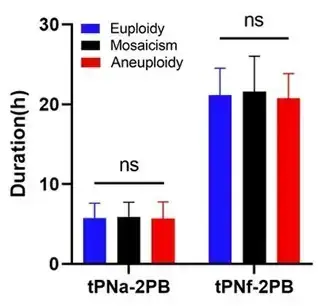
Academic Achievement
- Home
- About
- Academic Achievement
- 2022 Academic Publications
- New Perspectives on Embryo Chromosomal Abnormalities: Can Pronuclear Formation Timing Serve as a Predictive Marker?
New Perspectives on Embryo Chromosomal Abnormalities: Can Pronuclear Formation Timing Serve as a Predictive Marker?
Share
Presented by NUWA Fertility at the 2022 Taiwan Society for Reproductive Medicine (TSRM)
At the 2022 TSRM annual meeting, NUWA Fertility presented a study examining whether the timing of two-pronuclei (2PN) formation in early embryo development correlates with later embryo chromosomal normalcy. This research offers a new perspective on predicting chromosomal abnormalities in embryos.
Background: Exploring the Link Between Early Embryo Development and Chromosomal Abnormalities
Preimplantation genetic screening (PGS) has become a powerful tool for increasing IVF success rates by identifying embryos with normal chromosomal content. One major research focus in reproductive medicine is determining whether characteristics observed during early embryonic development can predict chromosomal status.

This study specifically explores whether the timing of 2PN formation—after intracytoplasmic sperm injection (ICSI)—is associated with euploid or aneuploid outcomes at the blastocyst stage.
Key Insight:
Early embryo development may not strongly correlate with chromosomal normalcy or abnormality.
Methods & Results: No Significant Correlation Found Between Early Development Timing and Chromosomal Status
The research team analyzed morphokinetic parameters of embryo development to evaluate whether specific early time points could be used as predictors of chromosomal status.
Overall, the data revealed no clear correlation between the timing of 2PN formation and whether the resulting blastocyst was euploid (chromosomally normal) or aneuploid (chromosomally abnormal).
However, the researchers also noted that within certain age groups, morphokinetic data may still inform individualized decision-making in embryo selection.
Clinical Significance: A More Comprehensive View of Embryo Potential
This study highlights the importance of not relying solely on early developmental timing to evaluate an embryo’s implantation potential.
Chromosomal status is a complex and multifactorial issue influenced by various biological factors.
Future research should integrate morphological assessment, time-lapse (morphokinetic) data, and genetic testing results to more accurately assess embryo viability and guide embryo selection—ultimately improving IVF outcomes.
NUWA Fertility remains dedicated to advancing the understanding of the many factors that influence embryo development and chromosomal health.
By applying cutting-edge research to clinical practice, we aim to deliver more precise and personalized IVF treatment strategies, helping patients achieve better outcomes on their fertility journey.
Seminars

